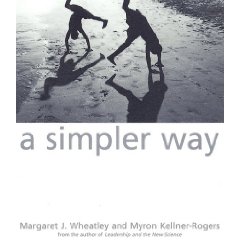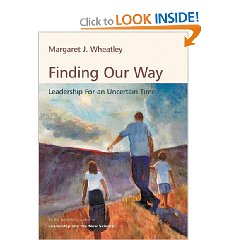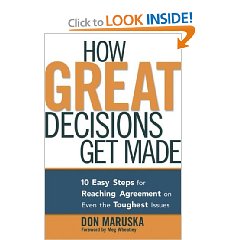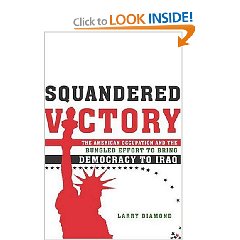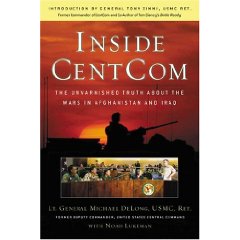This book is beyond five stars, and not just for business, where it is receiving all the praise it is due, but within government, where it has not yet been noticed. It was recommended to me by the author of
Building a Knowledge-Driven Organization and I now recommend it to everyone I know. If there are two books that can “change the world,” these are the ones.
Although the Chinese understood all this stuff centuries ago (Yin/Yang, space between the dots, the human web), the author is correct when she notes late in the book that the commoditization of the human worker (Cf. Lionel Tiger, Manufacture of Evil: Ethics, Evolution, and the Industrial System) and the emphasis on scientific objectivity and scientific manager (Cf. Jean Ralston Saul, Voltaire's Bastards: The Dictatorship of Reason in the West) were perhaps the greatest error we might have made in terms of long-run progress. Coincidentally, as I finished the book, on the Discovery channel in the background they were discussing how the leveeing of the Mississippi blocked the Louisiana watershed from cleansing the Mississippi naturally, as it once used to.
It's all about systems–the author does cite Donella Meadows' 1982 article in Stewart Brand's Co-Evolution Quarterly, but does not pay much heed to the large body of literature that thrived in the 1970's around the Club of Rome.
There are perhaps three bottom lines in this book that I would recommend to any government leader who hopes to stabilize and reconstruct our world:
1) Information is what defines who we are, what we can become, what we can perceive, what we are capable of achieving. Blocking or controlling information flows stunts our growth and virtually assures defeat if not death. It is the optimization of listening–being open to *all* information (and especially all the information the secret world now ignores)–that optimizes our ability to adjust, evolve, and grow.
2) Command & control is history, block and wire diagrams are history. General Al Gray had it right in the 1990's when he talked about “commander's intent” as the baseline. Leaders today need to be disruptive, to look for dissonant views and news, and to empower all individuals at all levels with both information, and the authority to act on that information.
3) Disorder is an *opportunity*. We have the power to define ourselves, our “opponents,” and our circumstances in ways that can either inspire protective, constricted, secretive, “armed” responses, or inclusive, open, sharing “pro-active” peaceful responses.
EDIT of 12 Dec 07: Haver ordered and will be reviewing several books that highlight the importance of diversity as a foundation for innovation.
The author is to be praised for noting early on in the book that “Ethical and moral questions are no longer fuzzy religious concepts but key elements in the relationship any organization has with colleagues, stakeholders, and communities.” I would extend that to note that social ethics and foreign policy ethics are the foundation for sustainable life on the planet, and we appear to be a long way from understanding that it is ethics, not guns, that will stabilize and fertilize…Cf Jonathan Schell, The Unconquerable World: Power, Nonviolence, and the Will of the People.
It also merits comment that the author essentially kills the industry of forecasting, scenarios, modeling, and futures simulations. I agree with her view (and that of others) that early warning is achieved, not through the theft of secret plans and intentions or the forecasting of behavior, but rather by casting a very wide net, listening carefully to all that is openly available, sharing it very widely (as the LINUX guys say, put enough eyeballs on it, and no bug will be invisible), and then being open to changed relationships. Trying to maintain the status quo will simply not do.
I give the author credit for carrying out an extraordinary survey of the literature on quantum mechanics, and for developing a PhD-level explanation of why old organization theory, based on the linear concepts of Newtonian physics, is bad for us, and how the new emergent organization theory, understood by too few, is let about the things and more about the relationships between and among the things.
This is an elegant essay and a heroic personal work of discovery, interpretation, and integration. While I would have liked to see more credit given to Kuhn, Drucker, Garfield, Brand, Rheingold, and numerous others that I have reviewed here for Amazon, on balance, given the academic narrowness of her Harvard PhD, I think the author has performed at the Olympic level. This is a radical book, somewhat reminiscent of Charles Hampden-Turner's book, Radical Man: The Process of Psycho-Social Development. which as I recall was not accepted by Harvard as a thesis at the time. Perhaps Harvard is evolving (smile).
For other key books that complement and precede this book, see my lists on information society, collective intelligence, business intelligence, and intelligence qua spies and secrecy in an open world.
Read this book BEFORE you read her new collection of essays, Finding Our Way: Leadership for an Uncertain Time
EDIT of 12 Dec 07: I must say, I am both astonished and disappointed that more of us have not found and absorbed this great work. Margaret Wheatley, whom I have not met (but I have met Tom Atlee, Juanita Brown, and Robert Buckman) strikes me as the “Mother” of a new form of continuous global education and innovation. Not sure what the answer is, but we have to pay more attention to this person's reflections.

